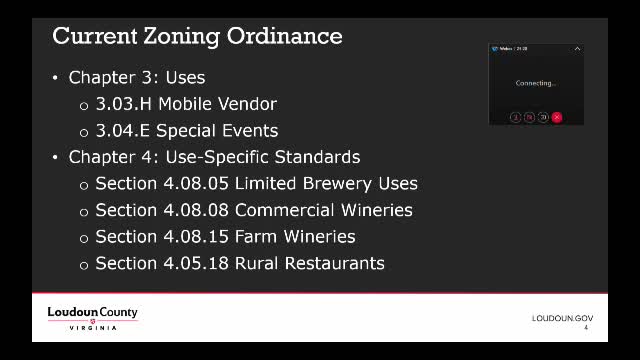Loudoun TLUC weighs whether weddings and events are "usual and customary" for wineries, breweries
Get AI-powered insights, summaries, and transcripts
Subscribe
Summary
The Transportation and Land Use Committee on Nov. 5 heard sharply divergent views on whether weddings and other special events should be treated as "usual and customary" agricultural activity at Loudoun wineries and breweries or as accessory uses that require a permit and additional safety review.
The Transportation and Land Use Committee on Nov. 5 heard that whether weddings and similar gatherings are "usual and customary" to Loudoun agritourism businesses — and therefore allowed as accessory activities — is the central policy question for the county's zoning rewrite.
County staff summarized the legal and administrative tension at the heart of the debate: longstanding county practice has treated many large, organized events as special events requiring permitting, while some industry representatives say events have become a customary and essential part of wineries' and breweries' business models. Judy (county counsel) told the committee that the question "is a decision of direction that we need from the board," reflecting decades of administrative practice that could be changed only with board guidance.
Industry speakers said events are a core part of their operations and economic viability. "We host over a million visitors annually," Tolga Bakke, owner of Hillsborough Winery and Brewery and a Loudoun County Brewers Association board member, told the committee, saying complaint and citation counts cited by opponents are low compared with visitation and economic figures. Virginia wineries' representative Lacey Huber said events supply a meaningful share of sales and urged the county to prioritize enforcement of existing rules rather than adding broad new limits.
Neighbors and conservation groups urged a different approach. Eugene (Gene) Galland and other speakers pressed the committee to preserve a "farm first" balance that privileges agricultural production over event-centered uses. Several residents said noise, lighting and traffic are the principal harms they experience, and they want durable, enforceable standards tied to measurable thresholds.
Building officials and county staff described operational differences that matter for public safety. Raymond Minaldi, Loudoun's building official, said structures built under agricultural exemptions often were not designed to the same building- and fire-safety standards required for high-occupancy assembly spaces. That difference — rather than whether some patrons wear formal attire — is one practical reason county staff has treated larger events as distinct permitting matters.
Committee members asked whether the county should treat customary event activity differently for agricultural uses that demonstrate on‑site production versus facilities that do not. Several supervisors and commissioners suggested a tiered approach keyed to acreage, intensity of use and demonstrated farm production. Staff said it will return with draft language and options for board direction.
The committee did not vote. Staff will summarize stakeholder feedback and present ordinance language options at future TLUC direction sessions.
